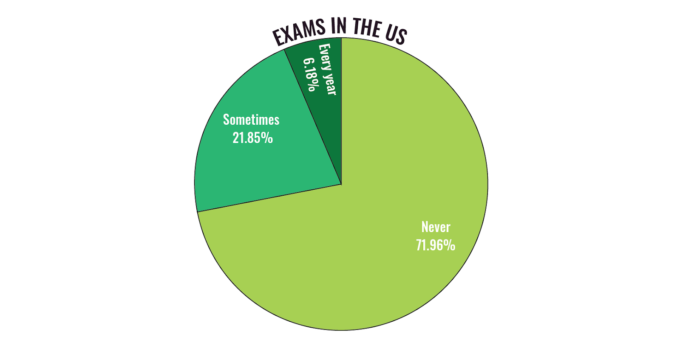Teachers often have a piano-exam default. They’re either for or against them, and their position is usually based on their background or where they grew up. But I think it’s worth taking this question back to its roots and asking, “What exactly are piano exams for?”

⬆️ Listen to the podcast above or keep on reading, whichever fits your style. ↙️
In many parts of the world (e.g. Ireland, UK, Australia and others) piano exams are just the done thing. When I tell someone I teach piano, they’ll often ask immediately whether I do “the grades”.
Whereas in the US, piano exams are a lot more unusual. Some teachers have their students do exams, but it’s more the exception than the norm, as shown in our 2021 survey data.

So we have to ask, is there something unique about kids from the US that means piano exams are not good for them, but are good for everyone else?
Of course not. I think it means that we’re all wrong. Piano exams shouldn’t be a default yes or a default no. It should be a decision for each student, parent and teacher trio to make together based on what’s best for that child’s progress.
Let’s look at some of the common reasons given for piano exams and put them under the microscope.
Piano Exams for Motivation
Motivation is the most common motivation for piano exams.
The logic goes like this:
- Student is put in for exam and given a deadline for the exam date
- Student pushes themself to learn the pieces, scales etc. in order to be ready for this deadline
The reality is more like this:
- Student has very poor practice habits
- Student is put in for exam in order to increase motivation to practice
- Student still doesn’t practise
- Three weeks before exam student panics and tries to cram
- Student gets a low mark in exam and is even less motivated
Sorry to be the bearer of bad news, but exams are not a magic practice cure.
Where piano exams can be motivating is for students who are already consistent practisers. These kiddos often push themselves a bit harder than usual during exam preparation, as they want to do well and they already have a foundation of good practice habits in place.
Piano Exams for Self-Confidence
This is a less-common reason for piano exams, but can be a valid one. When we have a student who is riddled with self doubt, constantly questioning whether they’re musical enough or talented enough, a mark on a piece of paper might be exactly what they need.

Putting a student forward for an exam in order to build their confidence can definitely backfire, though. You want to be sure that they will be successful in the exam and will be proud of the result they achieve. You need to pick the level very carefully and make sure they already have good practice habits in place before you start the exam preparation.
For more advice and resources about piano exams, check out my Planning Lessons hub page.
Piano Exams for Well-Roundedness
While I see the argument for the first two piano exam motivations above, using piano exams to make sure your lessons cover everything they should cover is where I draw a firm line in the concrete.
Narrow Syllabi
The first reason this is a terrible argument is because they’re simply not well-rounded. Most exams include:
- Baroque, Classical and Romantic pieces…with a few more modern works sometimes
- Scales
- Sight reading
- Aural tests
Do you think this list covers everything piano has to offer?
Even within those confines, the scope is limited. The sight reading is not always a realistic representation of what you might need to sight read in your real musical life, such as an accompanist. The scales usually focus on getting the notes and fingerings right – not on playing them with good technique. And the aural tests are extremely limited.
This is not a criticism of the exam syllabus. I don’t think they should do more extensive aural tests, for example. I think teachers should be aware that it’s a syllabus, not a curriculum.
Skewed Preparation
Let’s pretend that the list above is all we should include and that what’s on the syllabus can be taken as a curriculum. We’re still left with an issue, since teachers don’t actually teach all the things on this list.
To help you prepare for all elements of an exam, including sight reading and aural skills, enter your info below and I’ll send you the Painless Exam Preparation Planner for free.

Subscribe to updates and get the Painless Exam Preparation Planner
Enter your details to subscribe to the newsletter for piano teachers with information, tips and offers.
I hate spam as much as you do! I’ll only send you information that’s directly relevant to music teachers and you can unsubscribe at any time.
For the most part, students work their pieces for the majority of their exam preparation. Most teachers will also cover scales reasonably well.
But sight reading and aural? You’re lucky if those start to get a look 3 weeks out from the exam. And they’re still not taught during that time. Just run through with crossed fingers behind everyone’s backs.
Laziness
The thing that really gets my goat about claiming to follow an exam syllabus so that students will have well-rounded lessons is that It’s Just. Pure. Lazy.
I’m sorry, but it is.
Teachers who (beyond their first few years when they simply don’t know better) want the exam boards to decide what should be included in their lessons need a little shake. They need to see that their students deserve better, and so do they!
The lazy route is often the most boring, too. If you take the reins back and decide what your students learn and how, you will all have a more rich and enjoyable musical journey.
Do your students do piano exams? Why or why not?
I’d love to hear your thoughts on this in the comments below. 🙂